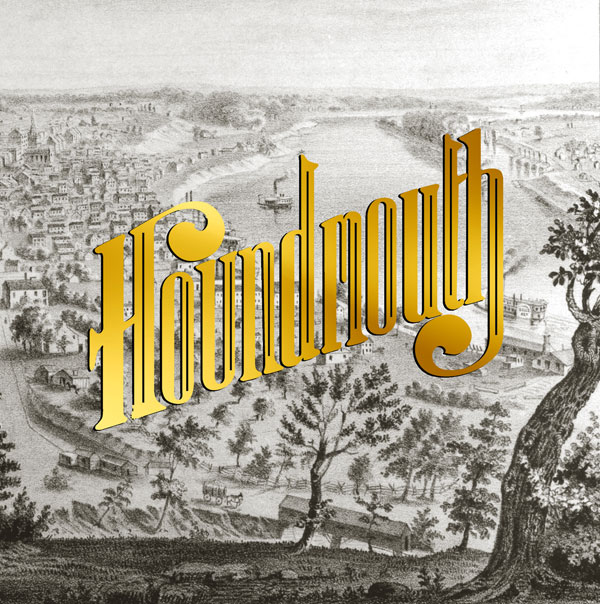
Houndmouth
From The Hills Below The City
(Rough Trade)
3.5 stars
Videos by American Songwriter
Located at the widest point of the Ohio River, New Albany – the northern neighbor of Louisville, which looms just across the water – is a town where traces of other places literally flow into the same basin. It’s a midwestern location with southern roots, a melting pot of big-city influence and small-town mentality. For some, a city like New Albany is depressing, a sad example of what happens when one town lives in the permanent shadow of its bigger, wealthier cousin next door. For residents like the four members of Houndmouth, though, it’s a ragtag muse, a soundtrack where the far-flung sounds of southern folk, urban soul, rust belt blues and heartland rock and roll mix.
Variety is the name of the game on Houndmouth’s debut LP, From The Hills Below The City. At its most basic level, this is a rambling, rootsy album, one that channels the earthy influence of Bob Dylan and the Band. Southern accents and coed harmonies are stacked onto a base of acoustic twang and electric fuzz. Southbound trains, sugar mamas and slow-moving towns fill the lyrics. Some songs lope; others blow the gates open at a full-speed gallop. You may not be able to hear the presence of trucker hats, flannel shirts and cowboy boots, but you know they’re there, cloaking the band in scruffy swirls of Americana atmospherics.
Sounds familiar, right? It is, but only when the band trims away the other sounds that decorate this wide-ranging debut. For every “Krampus” – a short, direct folksong that feels like a backstage warmup, consisting of little more than repetitions of a single phrase – there’s a handful of tunes that go deeper, reach wider and pack a harder punch. Since all four members sing, Houndmouth covers a good amount of ground, convincingly dabbling in one genre before shrugging off those restrictions and trying on something new. Like New Albany itself, these guys are a bundle of contradictions – a garage band playing loose Southern rock, a toned-down folk group, a vehicle for Matt Myers’ guitar-fueled Americana, a showcase for Katie Toupin’s powerhouse vocals – but there’s a framework to the tracklist, a bond that turns what could’ve been an exercise in pastiche into something cohesive.
“I’m on the road, and I’m singing slowly,” goes the first line to the opening song, a tribute to an itinerant life spent along the country’s backroads. Sure, the whole thing is a bit romanticized, the product of four 20-somethings who’ve grown tired of the digital age and begun to thirst for a simpler, bygone era. Like schooled storytellers or revisionist historians, Houndmouth spins off tale after tale of a picturesque past that might not have actually existed. Myers sings about hopping trains and robbing Five and Dimes in the sort of sweet, James Taylor-ish croon that suggests he’s done neither, while Toupin howls about an appetite for drugs and danger on the utterly fictional “Casino (Bad Things).” That’s the problem with looking to an earlier decade for inspiration; the music sounds great, but the band is forced to deal with the time-honored “authenticity problem,” wherein young musicians are blasted for delivering world-weary lyrics without the personal experience to back it up.
But who cares? By the time Myers rips into a guitar solo toward the end of “Hey Rose,” it doesn’t matter if the song’s first half – sung by bass player Zak Appleby in a breezy, honky-tonk baritone – sketches out a tale of coal mine towns and riverboat captains like some long-lost Mark Twain novel. The electric guitar dips, soars and twangs its way toward a fiery sendoff, glossing over any holes in Appleby’s story. Houndmouth may be lifting their source material from the same decades-old trove that their influences once explored – Delta folk, groove-based rhythm and blues, early rock & roll, primitive soul – but it’s a smart move, one that prevents them from becoming a third-generation copy of a secondary source. This is believable stuff, even if it’s far from biographical, and Houndmouth – at risk of being lumped into the ever-growing category of coed bands making revamped folk-rock for the 21st century – have developed a killer bark of their own.













Leave a Reply
Only members can comment. Become a member. Already a member? Log in.